8 concrete flooring ideas that will convince you this style can be surprisingly luxurious
Think concrete floors are only good for industrial schemes? These ideas will make you think differently about this type of flooring

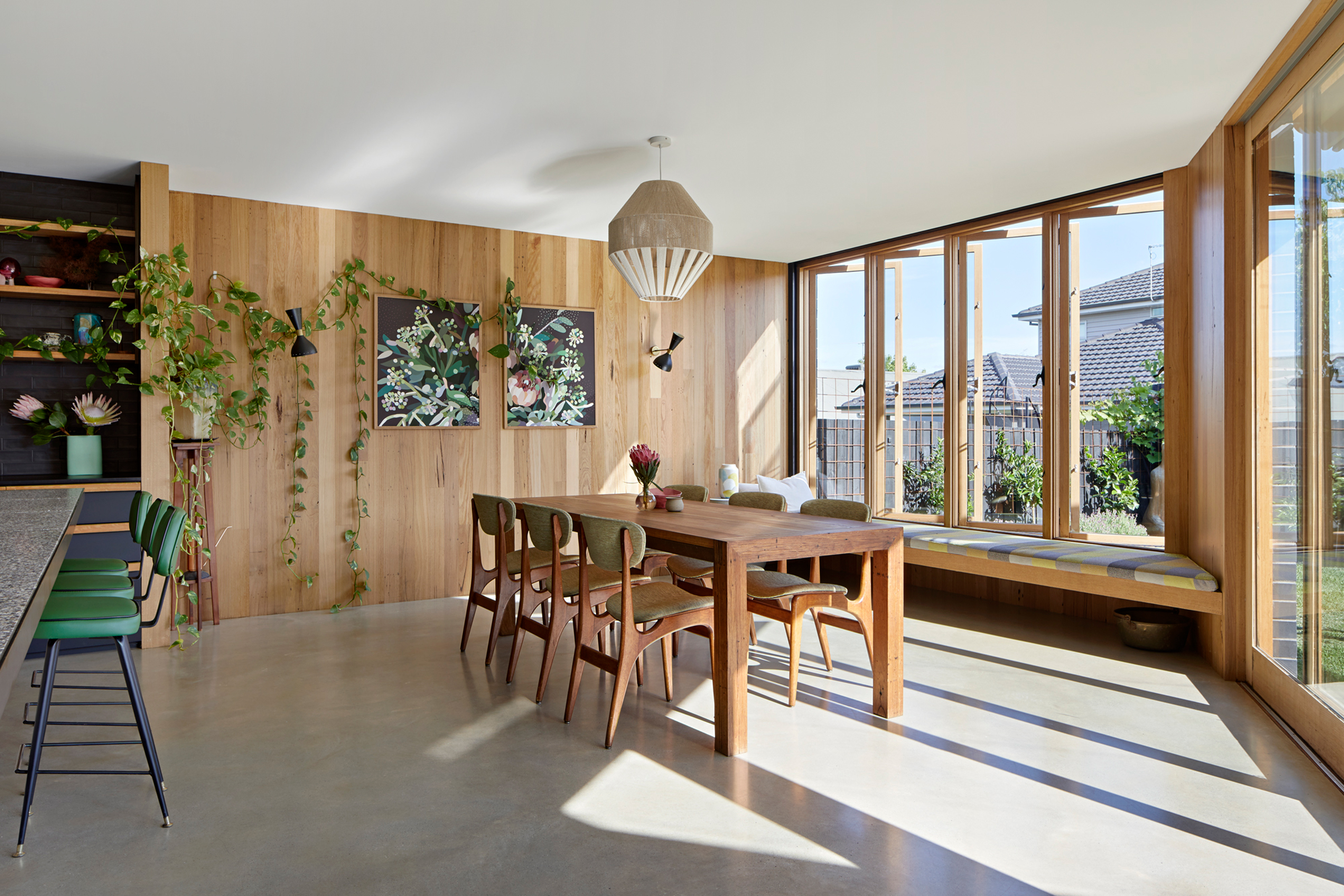
Concrete flooring isn't as popular in the US as it should be. Maybe it's considered a little too stark and urban, too hard and cold underfoot, but it's a style of flooring that's embraced in even the most luxurious of homes elsewhere in the world in abundance.
Yes, concrete is a floor type that has much more to offer than just industrial chic. It's a material that can balance out super luxe materials to keep a room scheme feeling contemporary and understated. Plus, it has that real feeling of luxury. It's generally installed seamlessly, removing fussy joint lines so that large open-plan spaces feel like one space.
Still not convinced concrete flooring is the right choice for you? These 8 real spaces, all using concrete floors in interesting ways, are sure to make you look at this material differently.

In his time as a property journalist, Hugh has specialized in covering self builds and renovation projects, delving in depth into the processes used to construct modern homes around the world. 'Concrete is not always thought of as an eco-friendly material, but in the right application, it should definitely be considered on the balance of its benefits,' he says. Here, he's curated some of the most creative ideas for concrete floors from global architects.
8 modern ideas for using concrete flooring
One of the major benefits of concrete flooring is that it's custom and adaptable. 'We enjoy using polished concrete as the material is versatile - it can be molded into any shape, with different textures, finishes and colors,' explains architect Oliver Leech. This makes its design applications numerous, and means concrete can be used as a bespoke design element to elevate your interiors.
1. Add color to bring energy to a concrete floor
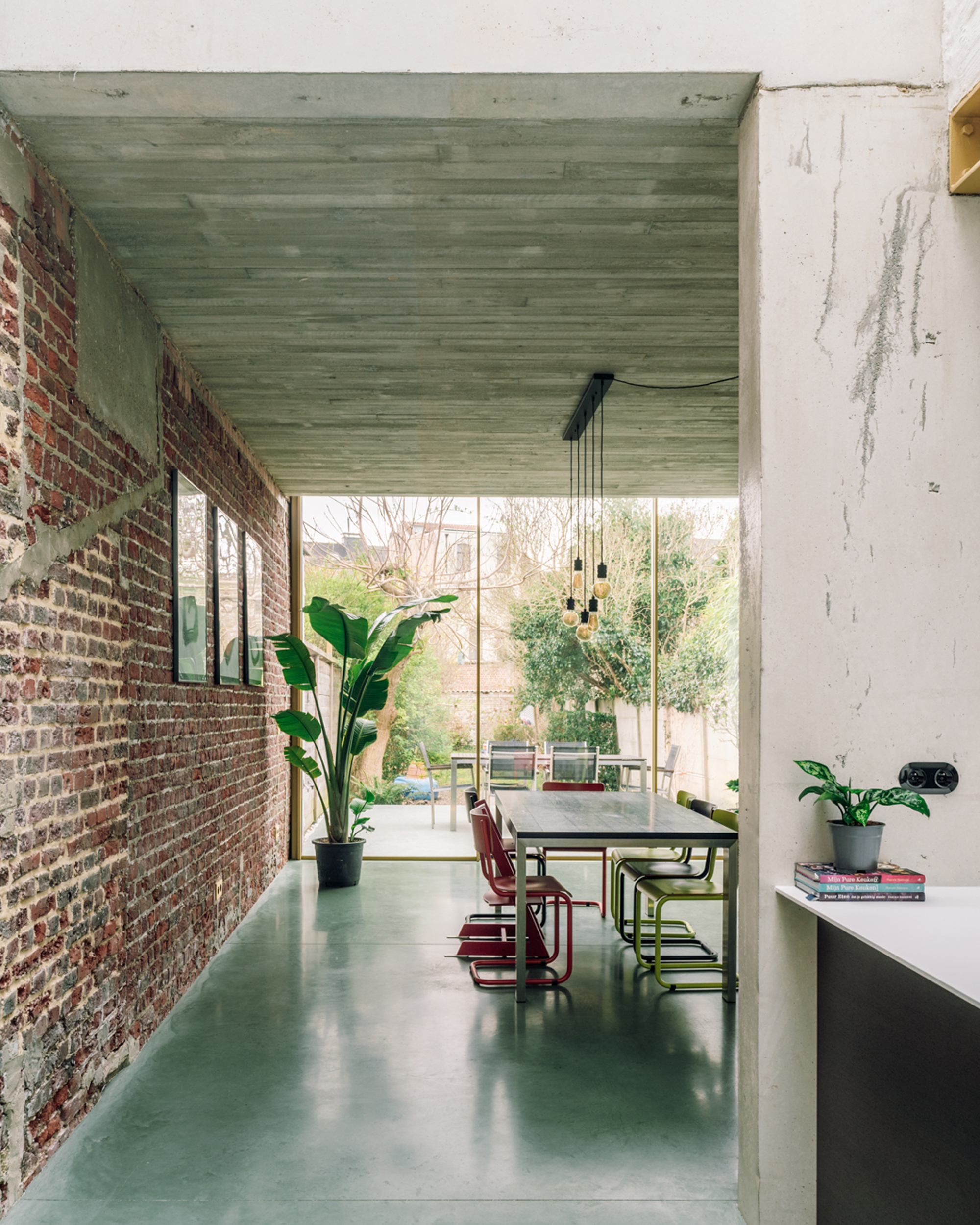
Did you know that you could install concrete floors in different colors? This is generally done by using concrete stains, which are pigments that penetrate and color an existing concrete floor, or by including color in the mix before a new concrete floor is laid.
In this modern home designed by Studio Kloek, a green concrete floor has been used to turn this usually urban element into a biophilic design feature.
'The color refers to the green color of plants, an unconscious link to nature,' Pieter Cloeckaert, founder of Studio Kloek, tells us. 'It is aesthetically beautiful because the dark green color matches with the existing old red brick color and the gold frames of the windows very well.'
The Livingetc newsletters are your inside source for what’s shaping interiors now - and what’s next. Discover trend forecasts, smart style ideas, and curated shopping inspiration that brings design to life. Subscribe today and stay ahead of the curve.
The one drawback of stained concrete floors, in particular? They're not as UV stable, so are best avoided outdoors and in areas with constant exposure to unfiltered natural light.
2. Embrace the imperfections for a wabi sabi style
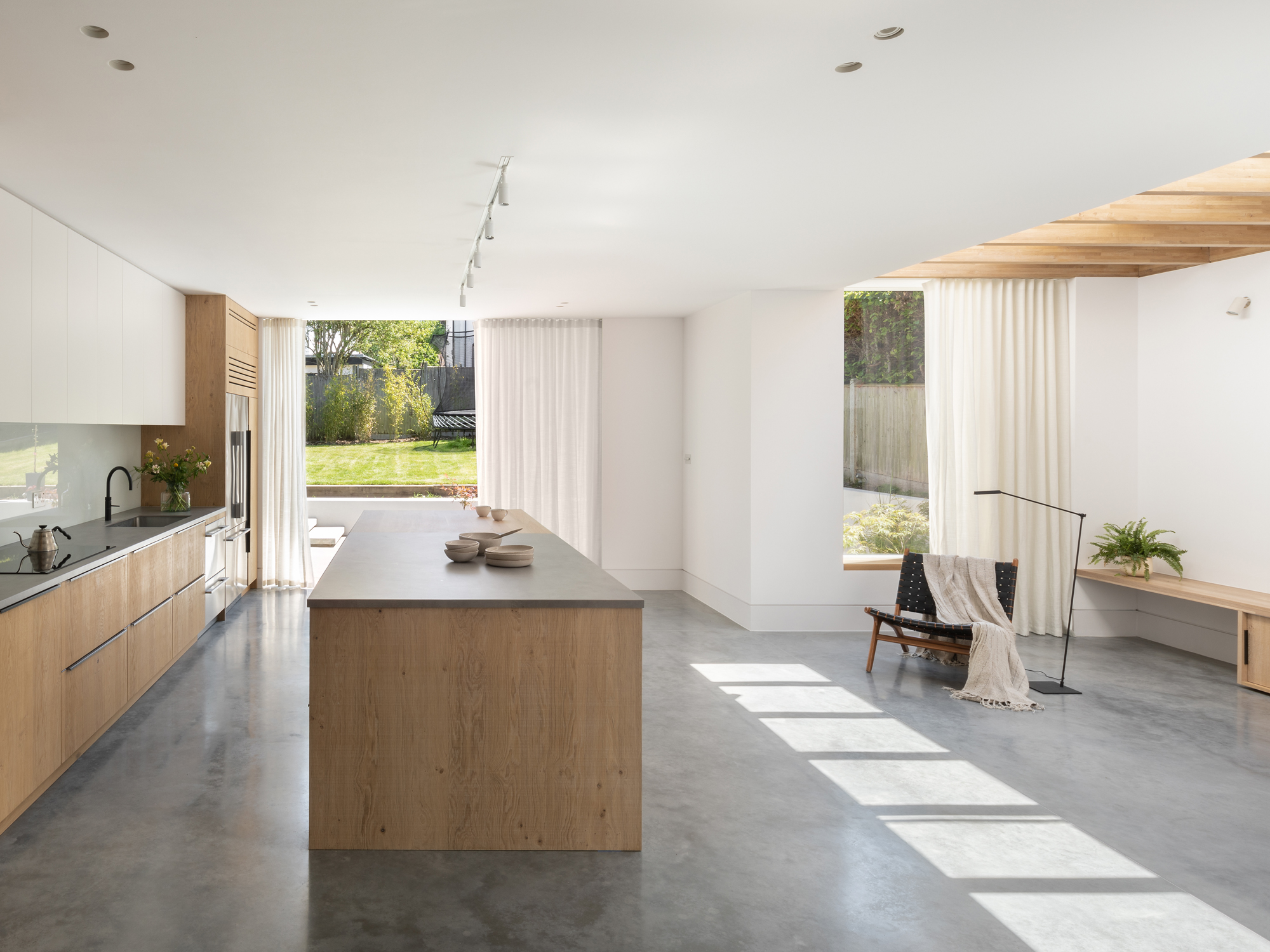
If you're seeking perfection, concrete flooring may not be the right fit for your home, as architect Oliver Leech explains. 'Concrete is a porous material so it will never stay the same and receives marks stains easily, as well as showing the makers marks from the day it was poured and buffed,' he explains. 'The aesthetic is therefore less refined and evokes some of the wabi-sabi principles of transience and imperfection.'
Wabi-sabi is a Japanese philosophy that looks to find beauty in the imperfect, and in this way, you can think about concrete floors as adding a natural patina to your home that lends its character and history, creating an on-trend modern rustic look.
Here, the concrete floor, topped with a light grey powder, balances out the warm textures of the kitchen. 'We chose a grey smooth matt floor to act as a neutral backdrop to the more rough textured oak cabinetry, and the more tactile timber façade,' Oliver tells us.
3. Make concrete floors an eco feature
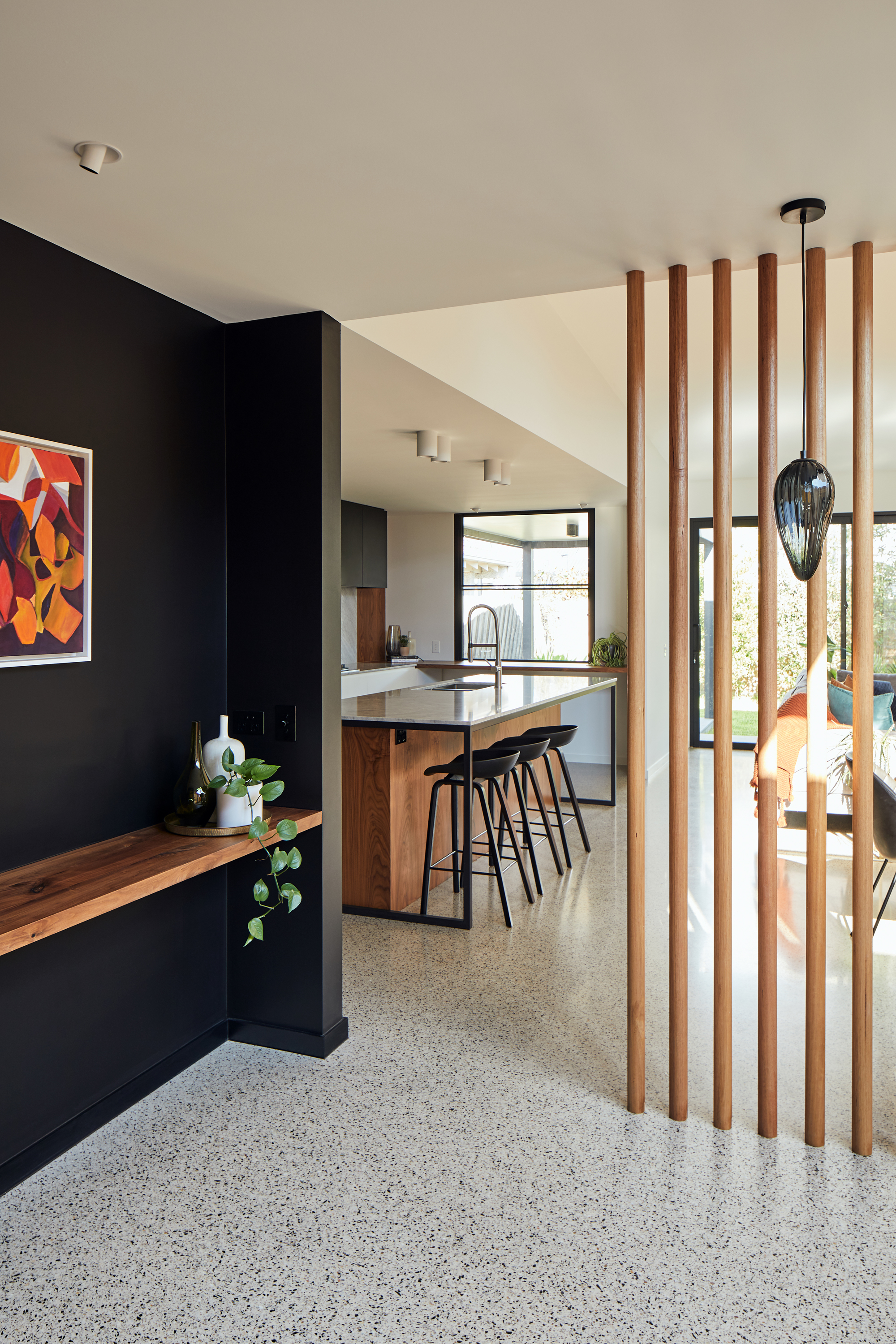
Architects have a complicated relationship with concrete when it comes to sustainable living. Cement is a huge producer of CO2 emissions, however, it's only a component of concrete, and when used thoughtfully, its durable, long-lasting nature means that it can be a worthy trade-off in the long run compared to alternatives. Plus, designers often use concrete flooring as a way to contribute to a home's heating mix, reducing its energy requirements.
'As designers we are always looking for a passive solar opportunity,' James Goodlet, director of Altereco Design, tells us of this modern home in Victoria, Australia. 'Although tricky to achieve on this site (with a south-facing backyard) the opportunity did present itself.'
This design feature relies on concrete's ability to absorb and disperse heat. 'The courtyard between the old and new made it possible to incorporate 3m tall north facing windows,' James explains. 'The sunlight floods the living space landing directly on the polished concrete slab which is a thermal mass, absorbing the heat, warming the internal space.'
4. Mix types of flooring for a modern home
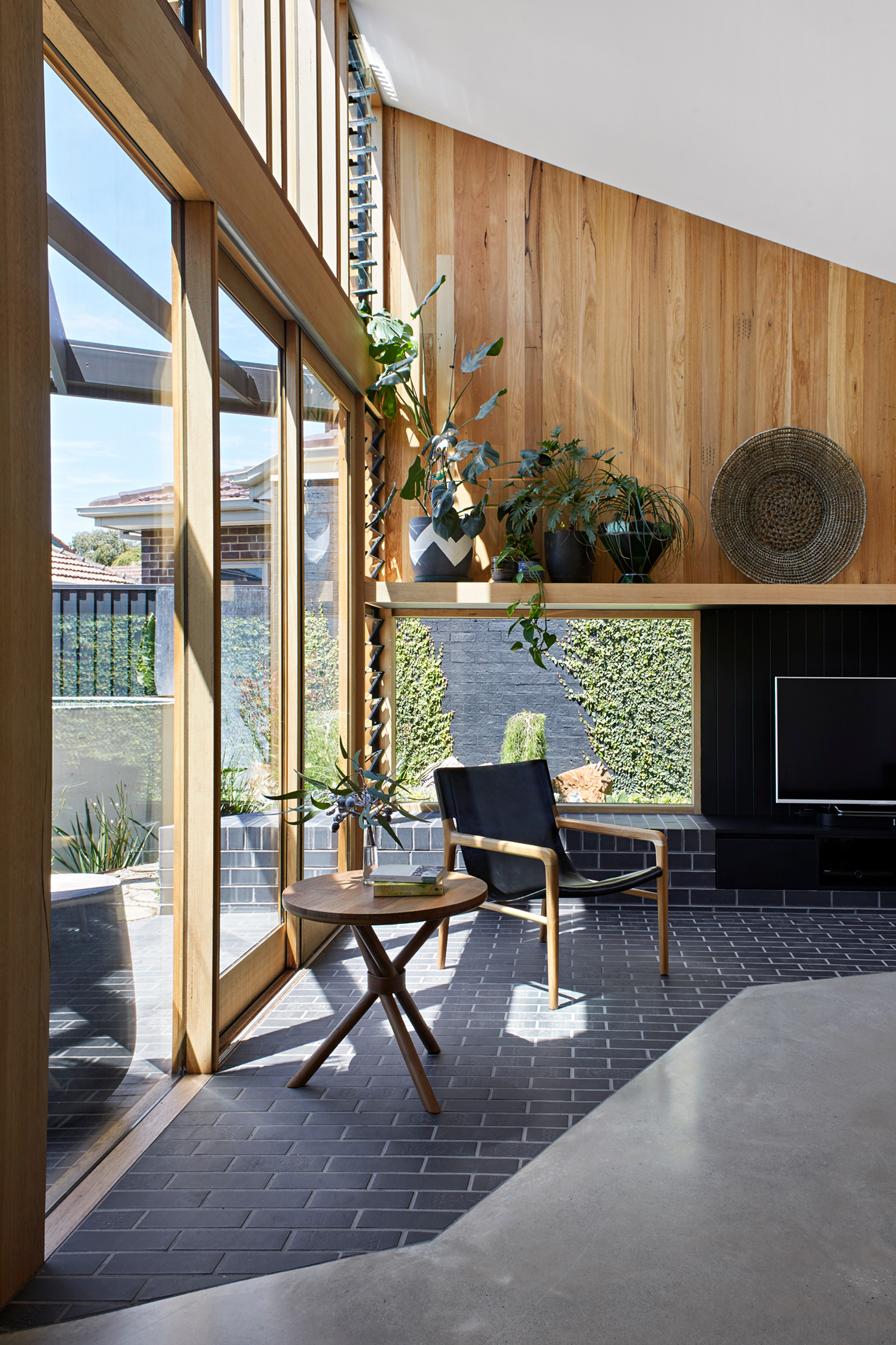
Concrete floors can appear monolithic - seamless interventions into a space that unites a floorplan with a common flooring. However, it doesn't have to be that way. It's possible to combine floor types to zone a room in different ways, or to add interesting design details.
In this space, for example, a polished concrete floor meets an exterior brick tile, which extends into the home from the outdoor patio. 'The living spaces are designed to be an extension of the garden,' explains Paul Porjazoski of BENT Architecture, 'and transitioning materials such as brick paving from outside to inside reinforces this connection.' The concrete floor extends through the rest of the living spaces in this single-story home.
5. Use concrete as one element of your flooring
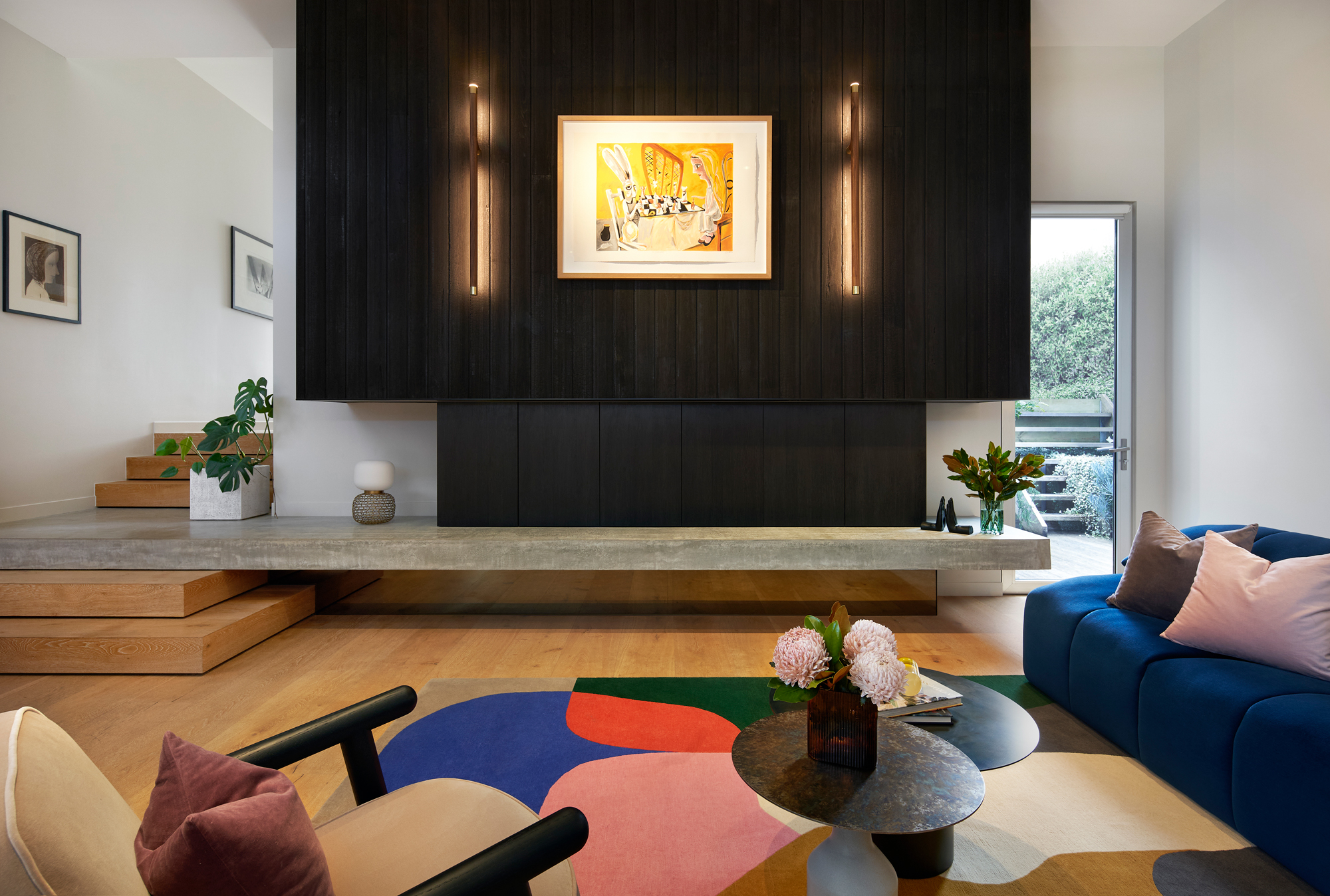
For another take on combining styles of flooring, this project sees a polished concrete plinth used under a modern fireplace, that also forms flooring for the adjacent stairs.
'In this project the concrete plinth was existing,' explains The Stylesmiths' David Puckering, lead designer of this inviting home. 'It actually extends to become a part of the stairs in the hallway, a unique architectural detail that connects the entryway to the living space.'
With its colorful furnishings, this space goes to prove the versatility of including polished concrete in a modern design. 'Polished concrete is a beautiful, organic material that suits many interior styles so it was easy to integrate into this colorful living room, offsetting the softness of plush furnishings and providing structure to delineate the space,' David explains. 'Practical also, it provided the perfect heat-resistant foundation for the new wood fireplace.'
6. Choose a style with exposed aggregate
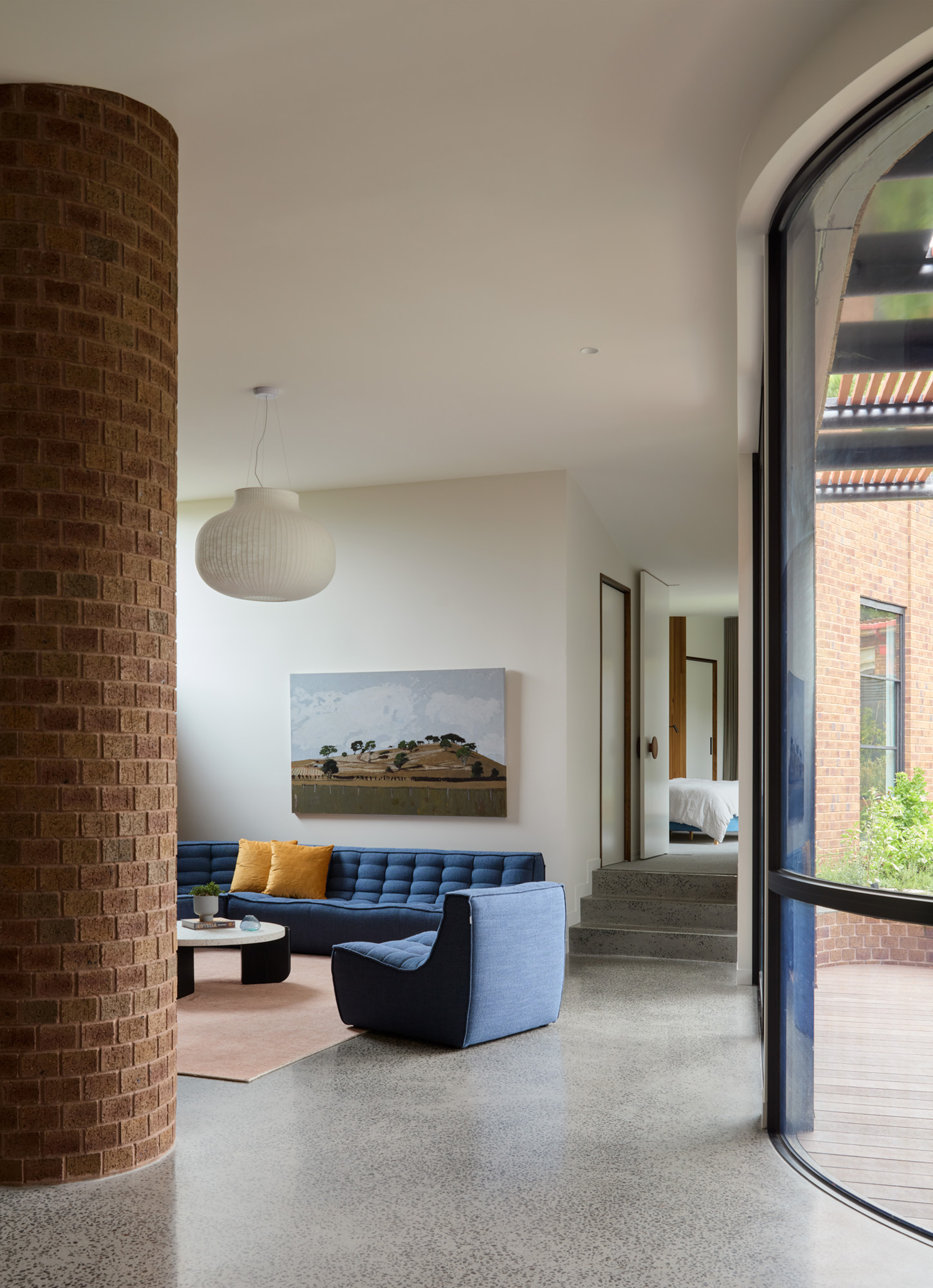
There are other options for your concrete floor, especially if you're after a more decorative look. Exposed aggregate floors, which have been ground down to reveal materials floating in the concrete mix, offer a modern speckled finish, similar in effect to traditional terrazzo flooring.
The benefits are not only in the aesthetic. If you're worried about the effects of wear and tear on a concrete floor, this style of concrete will disguise the least desirable signs of its ongoing patina such as scratches and stains.
7. Use across split levels
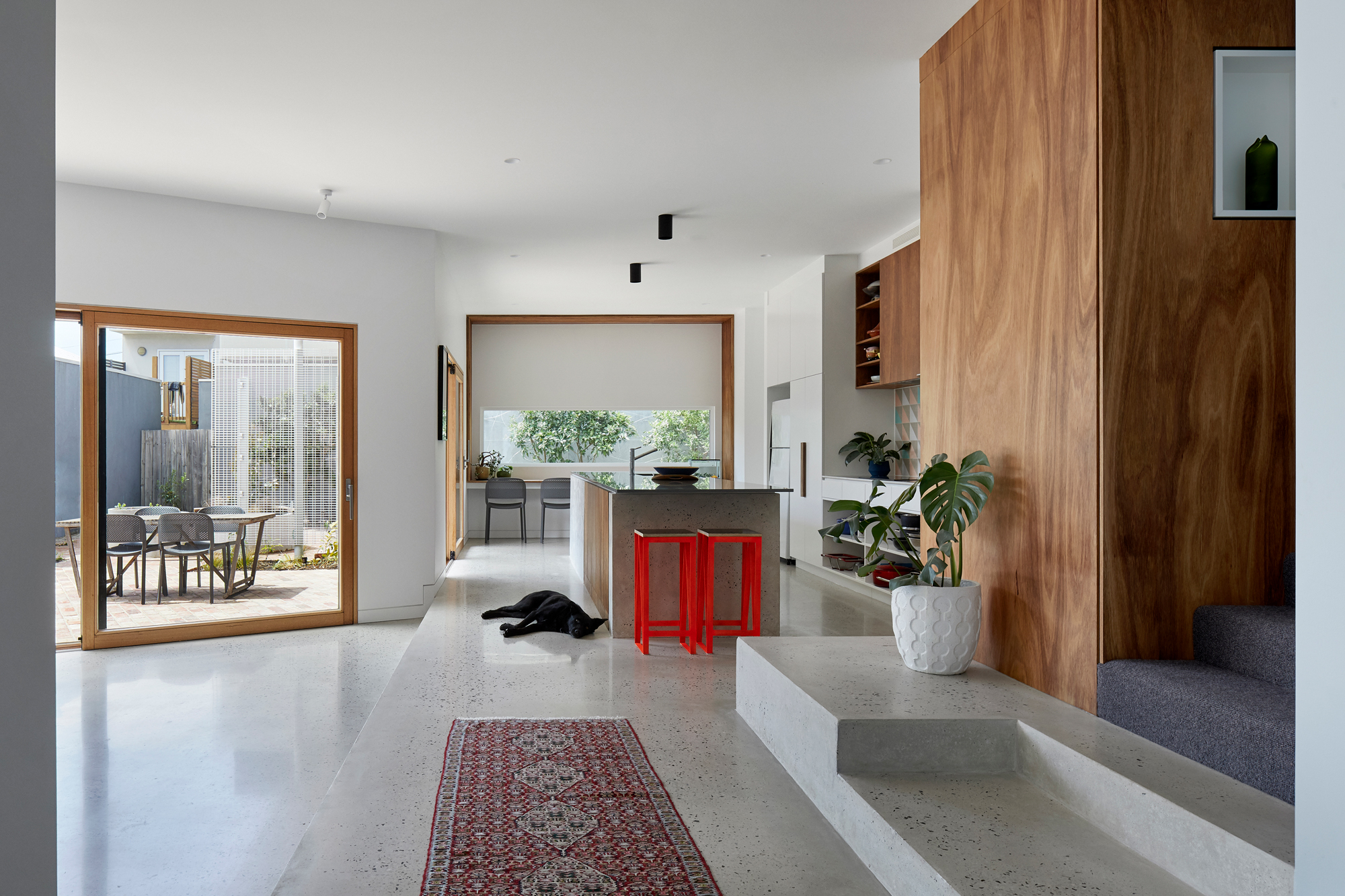
The seamless quality of concrete flooring makes it a useful choice in a home with various level changes, streamlining the design for a sleeker look. In this home by Poly Studios, a staggered floorplan helps to demarcate the open plan kitchen from the living space.
'In selecting polished concrete for the flooring, we were attracted to its durability, its thermal mass properties and the material character with its inherent variation of aggregate exposure,' architect Daniel Wolkenberg of Poly Studio tells us. 'It provided a monolithic base to the house, beyond a single floor plane, and was formed into multiple level changes which help to articulate a large space.'
8. Choose a darker shade
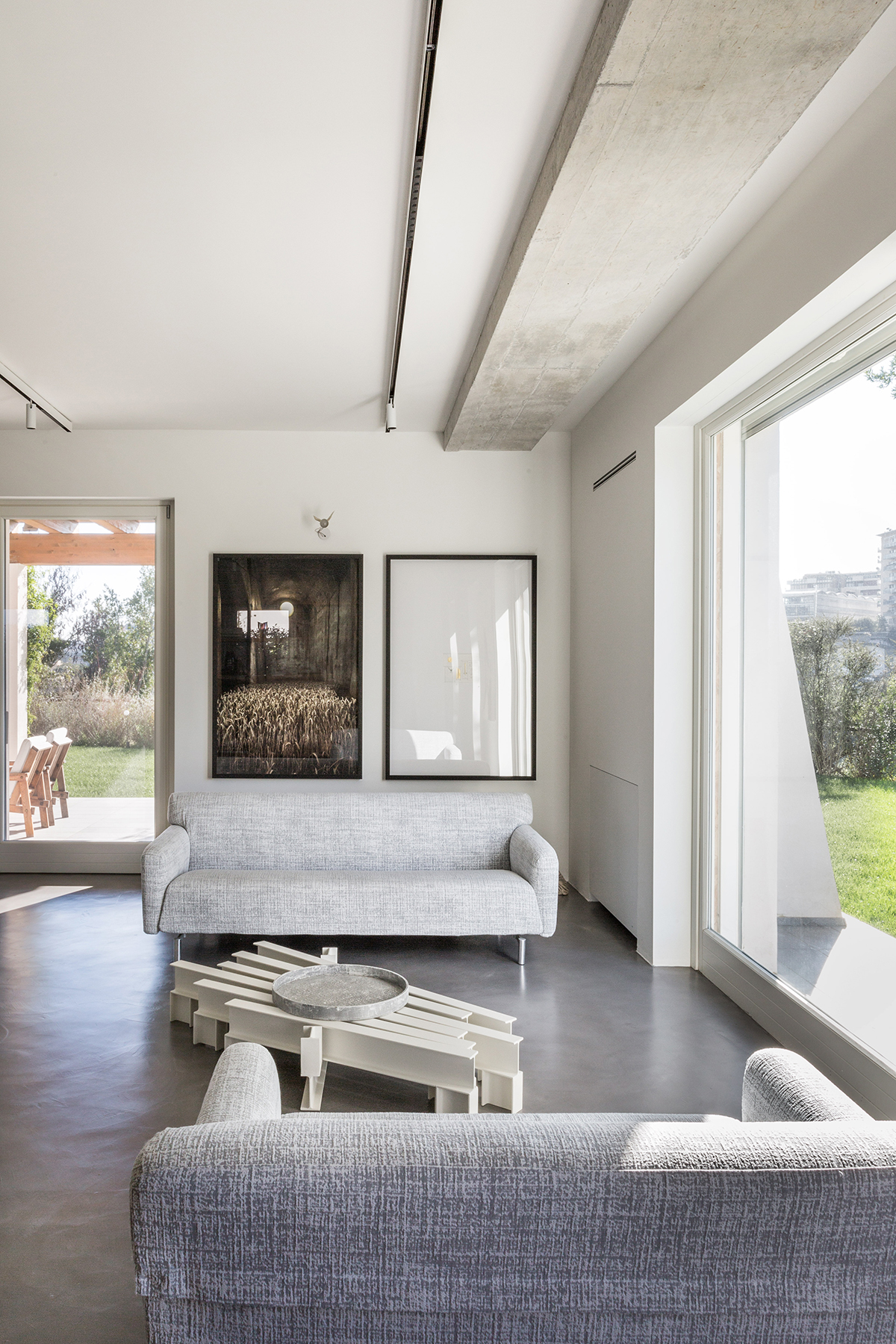
Mid-tone concrete floors are the standard for many homes adopting this material – a classic aesthetic that you can't go wrong with. However, by shifting the tone of your concrete you can also shift its design language.
In this project by architect Alvisi Kirimoto, a dark grey concrete floor has the texture you'd expect, but shifts the space away from this material's overt industrial connotations, while embracing its modern qualities.
Are concrete floors good in a house?
Concrete floors work well for a home, however, it does have its limitations. While it is durable, polished concrete can scratch and stain, so in choosing it, you'll have to also adopt a slightly different mindset where you embrace the patina of the floor.
It also needs to be used cautiously with underfloor heating, as sudden drastic temperature changes can cause cracks. You'll need to set underfloor heating to turn on slowly when used with polished concrete floors.
This type of poured concrete also largely only works for rooms on ground or basement levels. For upper floors, an alternative like microcement is more practical.

Hugh is Livingetc.com’s editor. With 8 years in the interiors industry under his belt, he has the nose for what people want to know about re-decorating their homes. He prides himself as an expert trend forecaster, visiting design fairs, showrooms and keeping an eye out for emerging designers to hone his eye. He joined Livingetc back in 2022 as a content editor, as a long-time reader of the print magazine, before becoming its online editor. Hugh has previously spent time as an editor for a kitchen and bathroom magazine, and has written for “hands-on” home brands such as Homebuilding & Renovating and Grand Designs magazine, so his knowledge of what it takes to create a home goes beyond the surface, too. Though not a trained interior designer, Hugh has cut his design teeth by managing several major interior design projects to date, each for private clients. He's also a keen DIYer — he's done everything from laying his own patio and building an integrated cooker hood from scratch, to undertaking plenty of creative IKEA hacks to help achieve the luxurious look he loves in design, when his budget doesn't always stretch that far.